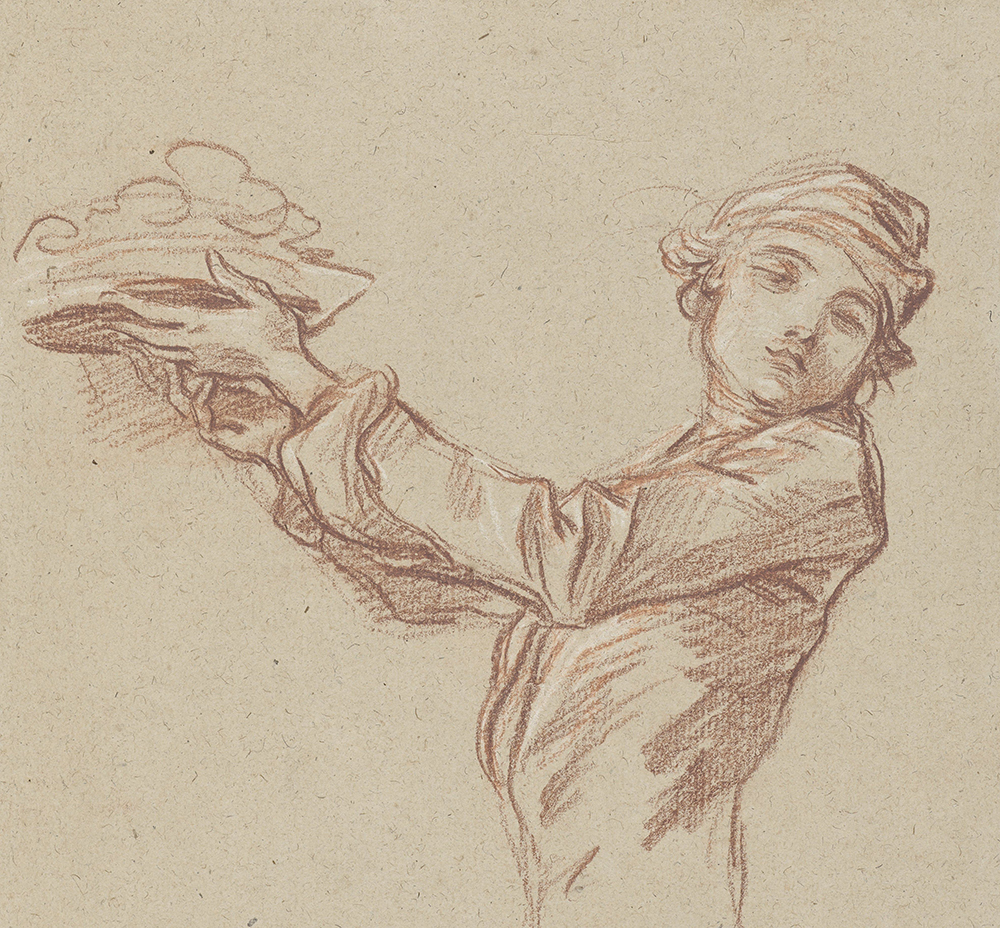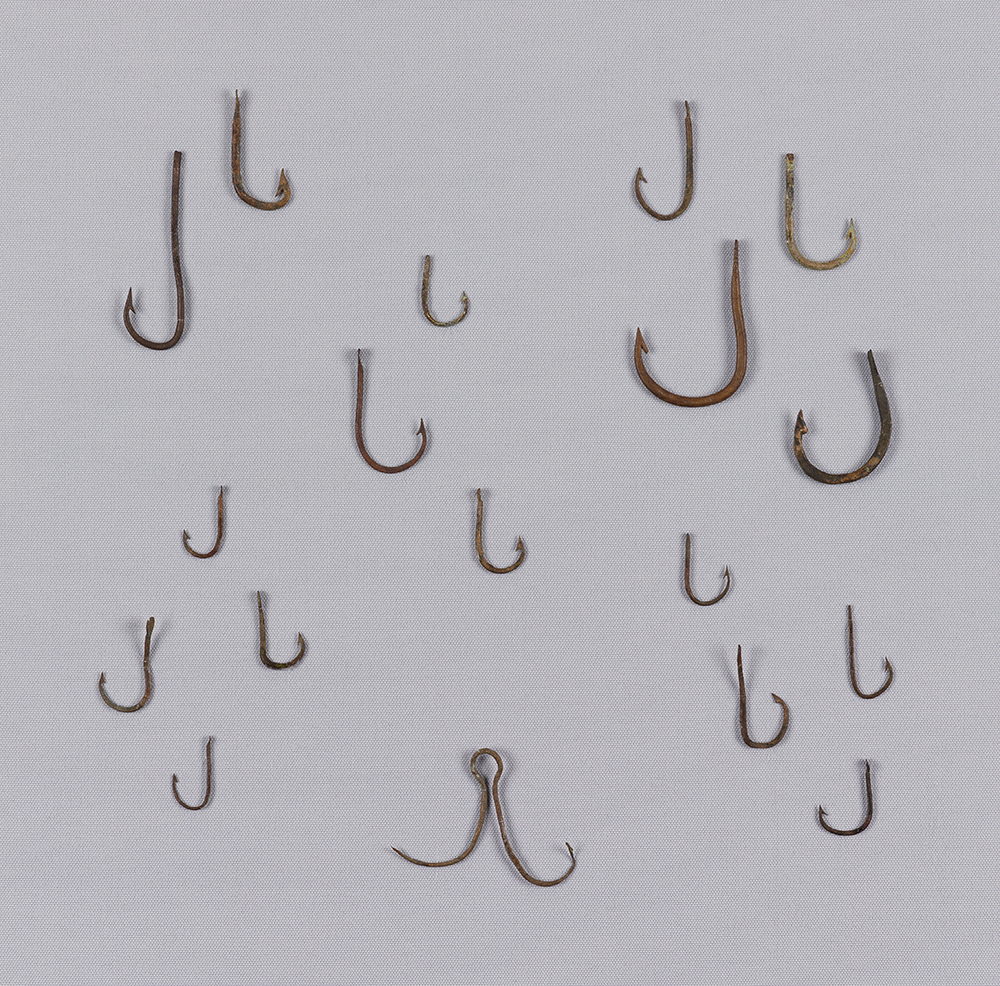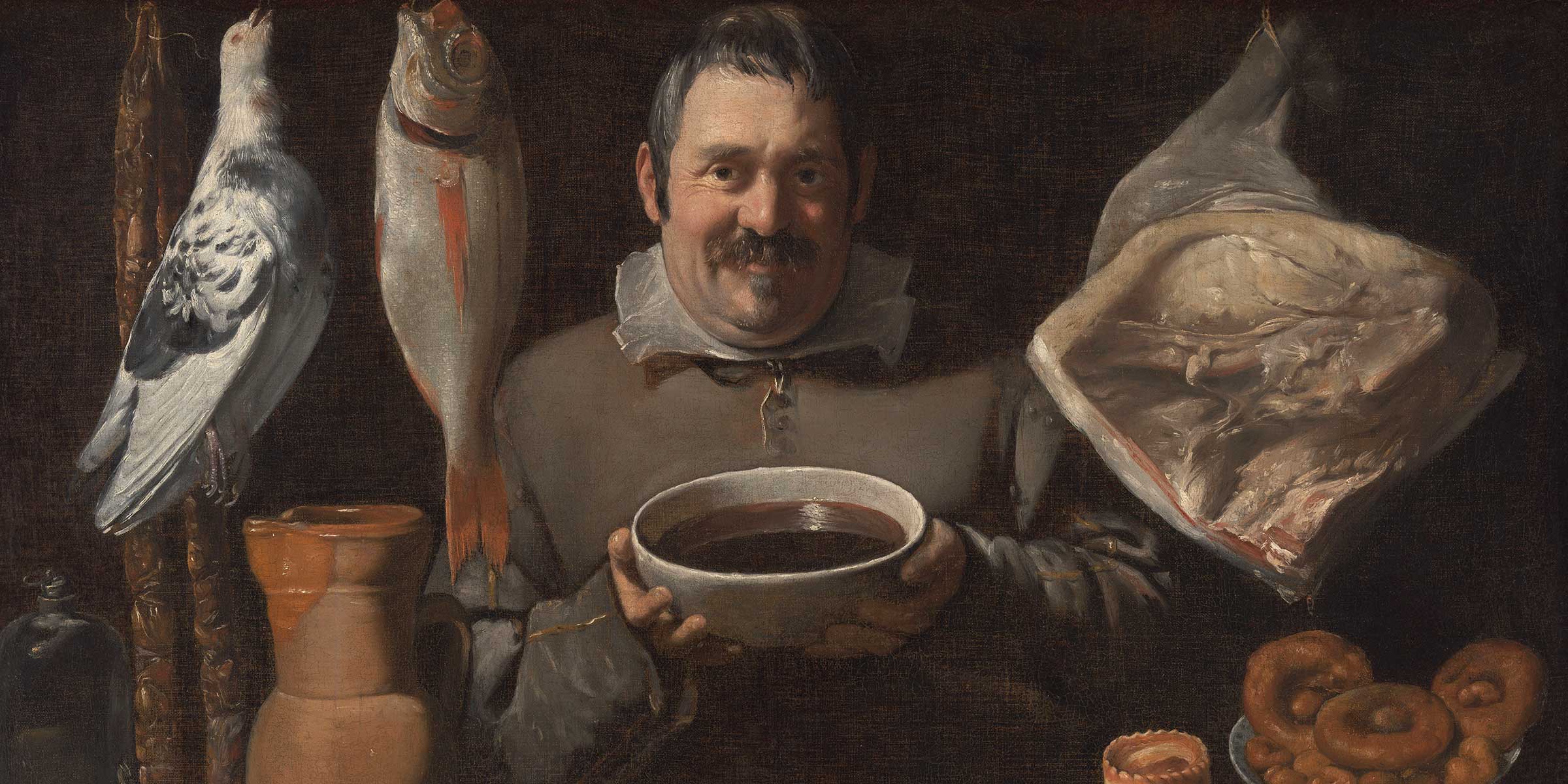In the spring of 1671 Louis de Bourbon, Prince of Condé welcomed Louis XIV to a three-day visit at his chateau in Chantilly. The niceties of the weekend, including the meals, were supervised by Condé’s maître d’hôtel, François Vatel, who died by suicide on the second day of the visit by running himself against a sword in his bedroom. This was supposedly done on account of a delayed shipment of fish that disrupted his plans for the king’s dinner. Fridays were fast days according to the Church calendar, and only fish, not flesh, was eligible for serving on fast days. Vatel’s body was discreetly and speedily removed from the chateau for burial, and a fellow manager, Jean Hérault de Gourville, took over the supervision of the king’s dinner that evening. It was unanimously considered a success.
Not much can be safely attributed to Vatel beyond the outline of his biography. Most of the known details about his life come from the three days before his death. Epistoler Madame de Sévigné happened to be staying near Chantilly that weekend and wrote down all she heard of the affair in letters to her daughter, then living in Provence. Vatel had previously served as maître d’hôtel to Nicolas Fouquet, who was France’s superintendent of finances until 1661, when he was disgraced and imprisoned for embezzlement. In 1669, after a brief intermission out of the country, Vatel moved on to his final position with the prince of Condé, who had himself been in disgrace for nearly a decade over his rebellious role in the Fronde before his reinstatement after the Peace of the Pyrenees in 1659. Disgrace came fairly cheap in those days. Good maîtres d’hôtel did not.

Vatel has been so often and so heartily commemorated by chefs that he is very often mistakenly remembered as one. He’s often erroneously credited with the invention of crème Chantilly, the precursor to modern whipped cream. Presumably the common posthumous impulse to attribute this invention to Vatel has been a consolatory one or a way of counteracting the vagueness of a maître d’hôtel’s duties. He might have been born in Switzerland, possibly as Fritz Karl Watel. At one point he was apprenticed as a pastry cook. Despite this training, there is no reason to think Vatel had a hand in cooking any of the dishes set before Louis XIV in 1671. His death, while clearly shocking to the rest of the household and guests, did not materially disrupt the course of the evening, nor did it alter Condé’s continuing rehabilitation one way or the other. The graciousness of Louis’ weekend retreat resumed its placid course.
Few contemporaries might have expected that Vatel’s death, disquieting as it was at the time, would form an enduring myth relevant to the development of French haute cuisine and subsequent post-Revolution understandings of the whimsical cruelties of an absolute monarchy. Few servants since Ganymede have had a longer or more illustrious afterlife. In 1825 dramatist Eugene Scribe published a comedy titled Vatel; its artistic liberties include giving Vatel an ingenious granddaughter-in-law who saves his life. Another play of the same name was published anonymously in 1845. The relative paucity of available facts about Vatel’s life leave writers plenty of room to embroider details, to invent relatives, colleagues, rivals, love interests, and counterweights in order to strengthen whatever point they hoped to make through him. Today there is a Restaurant Vatel in the 17th arrondissement in Paris and others in Lyon, Nîmes, Bordeaux, and Nantes. There is a Hotel Vatel in Switzerland and Vatel Restaurants in New South Wales, Australia; Bangkok; and La Crucecita, Oaxaca. The Vatel Group operates multiple Vatel Schools throughout France, which train franchisees for careers in hospitality, gastronomy, and tourism management. There are Vatel Clubs in Mexico, Luxembourg, and New York. In 1936 the Vatel Club threw a six-course midnight supper during their annual ball at the New Yorker Hotel, sponsored by the Angostura-Wupperman (as in bitters) Corporation.
In 2000 Roland Joffé directed a loose yet lush adaptation of Vatel’s final days starring Gérard Depardieu. The addition of Uma Thurman as a beautiful invented noblewoman named Anne de Montausier, a paramour of the king who is herself secretly in love with Vatel, presumably elevated the cause of his despair from fish to star-crossed romance. In Serve It Forth, M.F.K. Fisher referred to Vatel in the same breath as Auguste Escoffier—the “king of chefs and chef of kings,” according to the early twentieth-century French media—while Betty Fussell invoked the maître d’hôtel while recounting a disastrous attempt to entertain Kingsley Amis in her 1999 memoir My Kitchen Wars:
We were eight at table, dressed in formal suits and long gowns. Ignoring the useless buzzer at my feet, I would run downstairs, throw food in the dumbwaiter, work the pulley, dash back upstairs, tripping over my skirt, and serve. When it came to the saddle, all I had to carve with was one stubby knife with a dull blade. I was whacking away at the backbone when the entire roast slid off the platter and onto my neighbor’s lap…If this had happened in France, like Vatel I would have thrown myself on the stubby blade of my sword.
Not a chef but beloved by chefs and home cooks alike, held up as a patron saint of the exacting, the harried, the hurried, and all those beset by an unexpected dinner rush.
The maître d’hôtel, superintendent of chefs and household staff, acted as the public face and temporary repository of his master’s honor, and was responsible for making all arrangements necessary for convenience, comfort, and prestige. He was master of all servants except himself and very nearly not a servant at all. His role was not to absorb barked instructions and turn them into repetitive acts of obedience, as was the lot of a lower-ranked servant, but to act as if he were his own master in absentia, to think as he might think, to act as he might act, to anticipate and contrive on someone else’s behalf. The task of the maître d’hôtel was therefore doubly difficult: first, he must successfully twin himself, and once that impossibility was achieved, he must teach one of those selves to think like a master of servants, and then teach the other to take orders from the first. While we know very little about how Vatel conducted most of his day-to-day affairs, he acquitted himself honorably enough in those duties to be permitted to carry a sword, a distinction usually reserved for not just nobility but the particular branch known as the noblesse d’épée. That distinction would eventually purchase him a nobleman’s death, with execution by sword just as jealously reserved for that class as the rest of their various rights and appurtenances. For this reason the guillotine was initially regarded as a great democratic leveler, affording all criminals an equal portion in the highest possible end.

The sword is as important and necessary a detail to the story of Vatel’s death as the fish. The fish supply absurdity, the sword dignity, so that both are blended together in a poignant ambivalence. It is ridiculous to die for fish, it is impressive to die for honor. To unite both made Vatel immortal in one scale even as he was strategically forgotten, bundled hastily off the premises before sundown so that the king might not have to dine in the same building as a corpse.
Madame de Sévigné gives two accounts of Vatel’s death in her letters to her daughter. The first account, from April 24, is comparatively brief. The seasoned courtier does not commit herself to much of a reaction beyond shock:
I meant to tell you that the king arrived at Chantilly last evening. He hunted the stag by moonlight; the lanterns were very brilliant; and altogether the evening, the supper, the play—all went off marvelously well. The weather today makes us anticipate a worthy close to such a beginning. But I have just heard something as I came here from which I cannot recover, and which makes me forget what I was about to write you. Vatel—the great Vatel—maître d’hôtel of M. Fouquet, and who has recently been in the service of M. le Prince—the man above all others in ability, whose good head was capable of carrying the affairs of a state—this man, such as I knew him, finding that at eight o’clock the fish had not arrived, and unable to sustain the humiliation which he foresaw, stabbed himself. You can imagine the horrible disorder into which such a dreadful accident threw the fete.
The sketchiness of the details give the story a mythological aspect. The story begins in order, splendor, and successful contrivance, with only the highest and most rarefied of subjects, the king, the moon, the hunt, even the weather acting in concert with royal convenience and promising the continuation of pleasure. Then a sudden interruption, followed by the introduction of specificity, of detail, of names and titles and obligations to various households—we have stumbled firmly out of paradise and into the world, away from types and toward persons. Not just Vatel, but the great Vatel, not merely great in his own right but maintaining the greatness of M. Fouquet and M. le Prince, a “man above all others in ability” but above none in rank, whose imagination and mental scope were sufficient to contain the entire workings of a state therein, not just a man but a corporation within a man, dead at eight o’clock for want of fish.
There the story ends in horror, disorder, accident, and a wrench. Madame de Sévigné’s second account, sent on April 26, manages to restore the court to order by the end, and introduces an after-the-fact miraculous catch of fish that arrives moments after Vatel’s death:
I wrote you on Friday that he had stabbed himself: here is the story in detail.
The king arrived on Thursday evening; the promenade, the collation—served on a lawn carpeted with jonquils—all was perfect. At supper there were a few tables where the roast was wanting, on account of some guests whose arrival had not been expected. This mortified Vatel, who said several times, “My honor is gone: I can never survive this shame.” He also said to Gourville, “My head swims. I have not slept for twelve nights. Help me give the orders.” Gourville encouraged him as well as he could. The roast had not been wanting at the king’s table; but he could not forget that there was none at the twenty-fifth [table]. Gourville told M. le Prince, who went immediately to Vatel’s room, and said to him, “Vatel, everything is going on well. Nothing could be finer than the king’s supper.”
He replied, “My lord, your goodness overwhelms me. I know that the roast was missing at two tables.”
“Not at all,” said M. le Prince. “Don’t disturb yourself: everything is going on well.”
Midnight came; the fireworks, which cost sixteen thousand francs, did not succeed, on account of the fog. At four o’clock in the morning, Vatel, going through the château, found everyone asleep. He met a young steward, who had brought only two hampers of fish: he asked, “Is that all?” “Yes, sir.” The lad did not know that Vatel had sent to all the seaports. Vatel waited some time; the other purveyors did not arrive: his brain reeled; he believed no more fish could be had: and finding Gourville, he said, “My dear sir, I shall never survive this disgrace.” Gourville ridiculed him. Vatel went up to his chamber, placed his sword against the door, and stabbed himself to the heart; but only on the third attempt—for he gave himself two thrusts which were not mortal—did he fall dead.
Meanwhile the fish arrived from every quarter; and seeking for Vatel to give it out, they went to his room, knocked, burst in the door, and found him drowned in his blood. They ran to M. le Prince, who was in despair. M. le Duc wept; his father told the King in sorrow. It was said that this occurred because Vatel had a high sense of honor. He was praised, and his courage both praised and blamed. The king said that he had deferred going to Chantilly for five years because he knew how much trouble his visit would cause. He told M. le Prince that he ought only to have two tables and not provide for everybody. He vowed that he would no longer permit M. le Prince to do so; but it was too late for poor Vatel.
Gourville, however, tried to make up for his loss, in which he succeeded. They all dined very well: had a collation and a supper—walked—played—hunted. Everything was perfumed with jonquils; all was enchantment.
In this version, Vatel’s tragedy is enveloped and subsumed on both sides by perfume and the state. Louis XIV is now given the gift of presentiment, of having labored for five years to avoid just such a scenario, and indeed everyone of rank is assigned the most benevolent of feelings. The king himself economizes all future state dinners down to a mere two tables. The only faults to be found in the story now lie with either the vagaries of nature and the servant class or the efficiency of the highways. With the benefit of two days’ reflection and story shaping, the man himself has been demoted from “the great Vatel” of the first letter to the “poor Vatel” of the second, an object of gracious kingly pity rather than a potential rival. After all, if Vatel had higher standards than the king and was widely regarded as sane and sensible, then it necessarily implies something less than perfect about the king’s standards. Where previously his death had thrown everyone into “horrible disorder,” by the second account the loss is successfully made up, the jonquils and the enchanted hunt restored. Even without Vatel, “they dined very well.”
Some context for the fish might be in order, lest Vatel’s despair seem too far balanced in favor of the comic. A common Friday fast, such as that occasioned during the king’s visit, did not mean going a full day without food, but both type and quantity of the daily meals were reduced. The guests at a house party might be served one full meal and a small collation in the evening or a collation only, usually without meat or dairy products. According to his sister Elizabeth of France, Louis XIV and his retinue were routinely served between twenty and thirty dishes at dinner, and he “could eat four plates of soup, a whole pheasant, a partridge, a large plate of salad, two slices of ham, mutton au jus with garlic, a plate of pastry, all followed by fruit and hard-boiled eggs” in a single meal. Even a significantly reduced dinner on a fast day might require a great deal of fish indeed in order to keep pace.

With some allowance for regional variations and a reasonably flexible sense of what “fasting” might entail in any given community, scholar Brian M. Fagan notes in his 2007 book Fish on Friday: Feasting, Fasting, and Discovery of the New World that “by the thirteenth century, fast days took up more than half the year,” and that these frequent bouts of widespread demand did not always coincide with fluctuating hauls. Cod fishing expanded from Iceland to Newfoundland during the early modern era. Religious houses relocated or built extensions closer to the sea. Chantilly might call on fishing points at Le Havre, Honfleur, Rouen, Saint-Malo, Granville, and Dieppe for its daily haul. Not for nothing have fishmongers historically been characterized by grossness of speech. “As vulgar as a fishwife” is a common, if slightly old-fashioned, descriptor, and for good reason. Not much is more perishable, nor depreciates more readily, than fresh fish, which can only ever be spring fresh or ruined. Silence is the custom of the hunter after game or the slaughterer taking a beef cow unaware. Cornish fishermen of Vatel’s era built lookouts known as huer’s huts along the coast to look out for the summer arrival of schools of sardines, when the sea would all at once turn rust-red and churn with diving seabirds. The huer’s cry of “Hevva, hevva” announced the start of the fishing season. Those who want fish must make themselves heard.
It is the uncertainty, rather than the absence, of the fish that tips Vatel from distraction into despair. Two hampers of fish might be worse than none at all, as anyone who has scrambled to avert disaster during a dinner rush might attest. The entire absence of this or that ingredient would be challenging, but even worse than that is trying to stretch an insufficient amount into something resembling plenty. It is the reverse of Christ’s miracle at the wedding at Cana or the feeding of the multitude with the wonderful catch of fish. Fish, surprise, and plenty might make a miracle, but fish, surprise, and deficiency cannot even make a dinner party. No dinner party can survive uncertainty, and there is nothing so relentless as dinnertime, which must be renewed every day, even multiple times a day; no credit is given for the success of the dinner the night before, which might as well have been ten years ago. Today’s dinner cannot ever be redeemed later. Whatever edible honors Vatel might have conjured up for Fouquet could not survive Fouquet’s arrest, and whatever failure loomed for Condé behind the prospect of a fishless, fleshless Friday could not be amended by a cornucopia on Saturday.
If the king says the tables were sufficient, and Vatel says they were not, surely Vatel must give way to the king, not the other way around. What servant can remain unruffled in his position after contradicting his master, even unwillingly? How much more fatal would such a contradiction be for a great servant, one whose mind is capable of carrying the affairs of state, the very thing a servant’s mind ought not to wish to do? In Sévigné’s second account, Condé tells Vatel “everything is going on well,” but Vatel cannot affirm him, his mind rusted and stuck on the twenty-fifth roastless table. Either the master has failed to correctly honor the Sun King or his servant is in error. Vatel accepts the error and throws himself upon his sword.
With Vatel dead upstairs, it is now more than merely important that the king’s dinner be a success—it becomes inevitable. If Vatel can ruin Louis XIV’s dinner by dying, then Vatel is too necessary for either the prince’s or the king’s honor to bear. The best servant can never be truly indispensable. The state, now as relentless as dinner itself and attended to by the cheerful Gourville, enjoys not just one supper but a collation afterward, too, as if to confirm the point, followed by walking, hunting, and enchantment.
